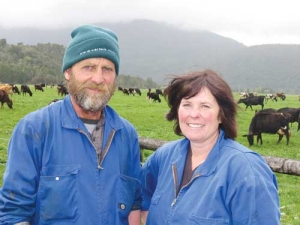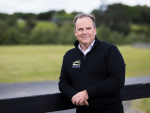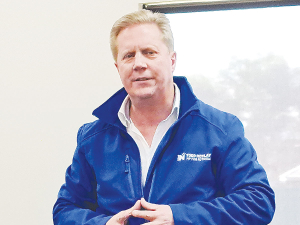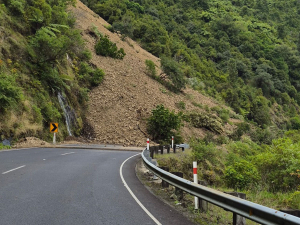Renee is the chairperson of Federated Farmers West Coast dairy section. Peter Burke visited her farm inland from GreymouthRenee Rooney and husband Greg farm in the small settlement of Inchbonnie near Lake Brunner; a picturesque country with the bush-clad hills seemly endlessly shrouded in mist.
The weather can be both extremely dry and wet.
Like all 'Coasters' their philosophy of farming in challenging conditions is both practical and successful. They work on the basis of old farming values, doing the basics right and a sensible conservative approach to farm management.
The Rooneys run 530 cows on their 320ha equity partnership farm. Renee says their stocking rate is low – 1.8 per ha – by many people's standards, but this conservative approach works well for them.
"We are pretty much self-contained and for us it is about breeding and feeding and improving our herds production through that," she says.
"We have tried different stocking rates but for us it's about finding what works best for our business. It's about profit and milking predominately grass feed cows.
"We put a bit of meal in the system on the shoulders and when there are issues around the weather and we call it lollies because the cows love it. We made nearly 1000 bales of bailage on milking platform and on our 46 ha run-off block which we own which is good because it saves costs."
They just try to the basics right, says Renee. They are currently producing 209,000kg/MS from their 530 cows which is higher production than the previous farmer was doing on the farm with 700 cows.
When they first came to the farm they had to cobble together a herd, but they had about 40 good cows and some quality heifers and over time have built up a high producing herd. They are continuing to improve the herd.
"It's a case of less is more. In terms of supplements PKE is swear word on our farm but we accept it has place in farming systems especially in times of drought," she says.
"My husband Greg says contented well-fed cows that eat grass give milk. Maybe there is a place for PKE if you have droughts and things. Greg also believes in using urea for shoulders and things only, whereas for some farmers it's now become just an everyday sort of thing. He's got old farming values."
The Rooney's minimise the use of nitrogen fertiliser but do strive to produce quality pasture with a re-grassing policy which sees new paddocks upgraded every year.
A big challenges the Rooney's face is their TB status – they have an infection in the herd and that places restrictions on how they farm. Renee says they knew that when they took on this particular farm but have been able to manage their way through it.
A big disadvantage is that they are unable to sell any calves born on the farm although they do keep about 70 heifers as replacements for themselves. An area of bush behind their farm has long been a TB hotspot and remains so despite much effort.
A true Coaster
Renee Rooney was born on the West Coast not far from where she and husband Greg now farm.
Her parents moved to Canterbury for a period, but returned to the Coast to dairy farm.
She stayed in Christchurch and worked in the city doing admin work for an educational training company. This was followed by a stint doing her OE before coming back to Christchurch to work for a man she describes as an amazing business mentor and life skills coach. Renee helped set up the business which grew rapidly.
"In the meantime when I came back from the UK I met a young local farmer Greg and so I commuted backwards and forwards for three years," she says.
"Maybe I was young and silly and after four years decided I would come and work on the farm.
"We started farming together at Inchbonnie as variable order sharemilkers then the first child came along. Then we decided to try farming in another area for a couple years.
"During that time we realised that Inchbonnie is a great place to farm and that's when we took up the equity partnership deal."
Foray into Feds
It was near neighbour, friend and Feds national board member Katie Milne that helped propel Renee Rooney into her current role as chair of West Coast dairy section.
Renee says she'd never had any ambition to take up a role with Feds although she had always been a member and saw the value of the organisation.
From her perspective it's very important the grass roots people in farming have a voice at the decision-making table and this is what she tries to do.
She couldn't do her job with Feds without the incredible support of husband Greg, she says. The fact that her three children are a bit older also helps. They are 9, 11 and 13.
Renee says her focus is also on the roadblocks facing the ag sector long term.
"For me it's what's the industry going to look like in 20 years' time - not about now and short term," she says.
"What will the future hold for our children? There does need to be voices around the table to engage and inform our urban cousins and to make them aware that the majority of dairy farmers are conservationists who care about the land."
But Renee says bureaucrats need to understand that farmers need flexibility to go about their daily business. There is huge amount of compliance and it's important people make rules for farmers that can be practically implemented.
Like many women on farms Renee is aware of the compliance issues and the huge amount of paper work.
"My husband just likes to grow grass and milk cows. He says I'm much better around a meeting table than he would be," she says.
The Rooney's have one person working for them full time and two others part time.
The extra staff make it easier for Renee to undertake her Feds work.
While every region is different, Renee says farmers on the West Coast face the perceived issue of isolation.
Unlike their counterparts over the Southern Alps in Canterbury they have to be more self-contained and plan to manage extreme climatic conditions.
In most other parts of the country farmers have greater resources they can call on for assistance, but not so on the Coast, she says.
The cost of freighting goods in and out is high which she makes a point of highlighting to others in the sector.
But despite the challenges, the Rooney's farm and others in the Inchbonnie area provide a unique and profitable farming environment.

















